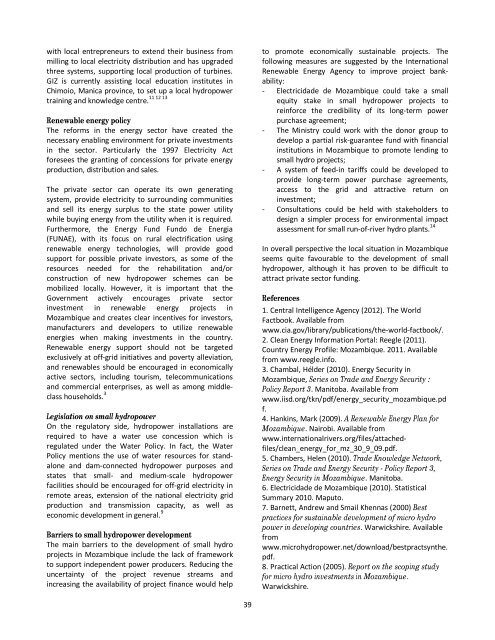WSHPDR_2013_Final_Report-updated_version
WSHPDR_2013_Final_Report-updated_version
WSHPDR_2013_Final_Report-updated_version
You also want an ePaper? Increase the reach of your titles
YUMPU automatically turns print PDFs into web optimized ePapers that Google loves.
with local entrepreneurs to extend their business from<br />
milling to local electricity distribution and has upgraded<br />
three systems, supporting local production of turbines.<br />
GIZ is currently assisting local education institutes in<br />
Chimoio, Manica province, to set up a local hydropower<br />
11 12 13<br />
training and knowledge centre.<br />
Renewable energy policy<br />
The reforms in the energy sector have created the<br />
necessary enabling environment for private investments<br />
in the sector. Particularly the 1997 Electricity Act<br />
foresees the granting of concessions for private energy<br />
production, distribution and sales.<br />
The private sector can operate its own generating<br />
system, provide electricity to surrounding communities<br />
and sell its energy surplus to the state power utility<br />
while buying energy from the utility when it is required.<br />
Furthermore, the Energy Fund Fundo de Energia<br />
(FUNAE), with its focus on rural electrification using<br />
renewable energy technologies, will provide good<br />
support for possible private investors, as some of the<br />
resources needed for the rehabilitation and/or<br />
construction of new hydropower schemes can be<br />
mobilized locally. However, it is important that the<br />
Government actively encourages private sector<br />
investment in renewable energy projects in<br />
Mozambique and creates clear incentives for investors,<br />
manufacturers and developers to utilize renewable<br />
energies when making investments in the country.<br />
Renewable energy support should not be targeted<br />
exclusively at off-grid initiatives and poverty alleviation,<br />
and renewables should be encouraged in economically<br />
active sectors, including tourism, telecommunications<br />
and commercial enterprises, as well as among middleclass<br />
households. 3<br />
Legislation on small hydropower<br />
On the regulatory side, hydropower installations are<br />
required to have a water use concession which is<br />
regulated under the Water Policy. In fact, the Water<br />
Policy mentions the use of water resources for standalone<br />
and dam-connected hydropower purposes and<br />
states that small- and medium-scale hydropower<br />
facilities should be encouraged for off-grid electricity in<br />
remote areas, extension of the national electricity grid<br />
production and transmission capacity, as well as<br />
economic development in general. 9<br />
Barriers to small hydropower development<br />
The main barriers to the development of small hydro<br />
projects in Mozambique include the lack of framework<br />
to support independent power producers. Reducing the<br />
uncertainty of the project revenue streams and<br />
increasing the availability of project finance would help<br />
to promote economically sustainable projects. The<br />
following measures are suggested by the International<br />
Renewable Energy Agency to improve project bankability:<br />
- Electricidade de Mozambique could take a small<br />
equity stake in small hydropower projects to<br />
reinforce the credibility of its long-term power<br />
purchase agreement;<br />
- The Ministry could work with the donor group to<br />
develop a partial risk-guarantee fund with financial<br />
institutions in Mozambique to promote lending to<br />
small hydro projects;<br />
- A system of feed-in tariffs could be developed to<br />
provide long-term power purchase agreements,<br />
access to the grid and attractive return on<br />
investment;<br />
- Consultations could be held with stakeholders to<br />
design a simpler process for environmental impact<br />
assessment for small run-of-river hydro plants. 14<br />
In overall perspective the local situation in Mozambique<br />
seems quite favourable to the development of small<br />
hydropower, although it has proven to be difficult to<br />
attract private sector funding.<br />
References<br />
1. Central Intelligence Agency (2012). The World<br />
Factbook. Available from<br />
www.cia.gov/library/publications/the-world-factbook/.<br />
2. Clean Energy Information Portal: Reegle (2011).<br />
Country Energy Profile: Mozambique. 2011. Available<br />
from www.reegle.info.<br />
3. Chambal, Hélder (2010). Energy Security in<br />
Mozambique, Series on Trade and Energy Security :<br />
Policy <strong>Report</strong> 3. Manitoba. Available from<br />
www.iisd.org/tkn/pdf/energy_security_mozambique.pd<br />
f.<br />
4. Hankins, Mark (2009). A Renewable Energy Plan for<br />
Mozambique. Nairobi. Available from<br />
www.internationalrivers.org/files/attachedfiles/clean_energy_for_mz_30_9_09.pdf.<br />
5. Chambers, Helen (2010). Trade Knowledge Network,<br />
Series on Trade and Energy Security - Policy <strong>Report</strong> 3,<br />
Energy Security in Mozambique. Manitoba.<br />
6. Electricidade de Mozambique (2010). Statistical<br />
Summary 2010. Maputo.<br />
7. Barnett, Andrew and Smail Khennas (2000) Best<br />
practices for sustainable development of micro hydro<br />
power in developing countries. Warwickshire. Available<br />
from<br />
www.microhydropower.net/download/bestpractsynthe.<br />
pdf.<br />
8. Practical Action (2005). <strong>Report</strong> on the scoping study<br />
for micro hydro investments in Mozambique.<br />
Warwickshire.<br />
39


